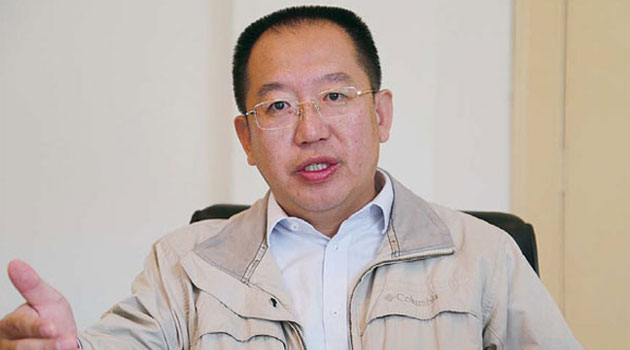
Guo ce, counselor at the Economic and Commercial Office of the Chinese Embassy in Kenya, says importers should understand the basic economic and trade rule. Edith Mutethya / China Daily
NAIROBI, Kenya, Oct 18 – As more and more African importers look to China as a source of goods, there is a growing awareness that buyers need to know how to access good quality items.
Buyers also need to understand the importance of following the right channels in order to promote good trade cooperation between the two economies.
Several businesses, particularly Small and Medium Enterprises (SMEs), have been lured into importing poor quality products, especially electrical goods and machinery, and have consequently suffered huge losses.
One victim, Johnstone Waweru, says he went to China to order electrical goods, only to find they were sub-standard on delivery. That marked the end of his nascent business.
Similar complaints have been made to the Economic and Commercial Counselor’s Office of the Chinese Embassy in Kenya, which is mandated to provide economic and trade information to entrepreneurs from both Kenya and China in order to promote economic and commercial cooperation between the two countries.
Guo Ce, the office counselor, says his department has dedicated Mondays to getting feedback as well as advising the business community about importing from China.
Occasionally it receives complaints, mostly from SMEs whose companies are not registered. “We don’t have statistics, so we cannot authoritatively confirm whether the complaints are increasing or decreasing,” he says.
Guo attributes the complaints to the low pricing of ordered goods without assurances on quality, lack of legal contracts with Chinese factories, lack of understanding of the use to which items will be put and misunderstandings between parties.
“If a customer wants good quality products, he has to pay a reasonable price, but if the focus is on low cost, the standard will not be the same as for high-priced goods due to the production cost. That is the basic economic and trade rule,” says Guo.
He says some people import goods through illegal channels, so they are not inspected for quality control. This involves importing products without customs permits or payment of the required taxes.
Office secretary Wang Huan says complaints have also been received of import scams. These involve scammers pretending to be legitimate online suppliers, either with fake websites or fake ads on genuine retail sites, ripping off unsuspecting importers.
“Some importers order and pay for goods online without requesting samples from the supplier, without checking the credibility of the company and without signing a contract to protect their legal rights,” she says.
The office offers to suggest reliable e-commerce websites to importers who cannot travel to China to vet suppliers.
Once importers have had a conclusive discussion with their chosen supplier, they are advised to visit the Counselor’s Office before sending any money to get suggestions on how to check the credibility of merchants.
Guo says his office is in the early stages of discussions with the Kenya Bureau of Standards to come up with a database of companies doing illegal business between China and Kenya in order to compile a blacklist.
However, not all importers are complaining. Some are happy with the items they have imported and their businesses have thrived. Among them is BBC Auto Spares Ltd, a motor vehicle spare parts company based in Kenya, which has been importing from China for the last 10 years.
The company’s finance manager, Shritesh Lakhani, says doing business with the Chinese is easy and exciting.
“Once I give specifications of what I want, I’m assured of getting good-quality products. This contrasts with my homeland India where importers grapple with bureaucracy,” he says.
Patrick Kuria, director of Pes Electricals and Hardware, shares a similar story. For the past decade, he’s been importing electrical accessories, water pumps and carwash facilities from China and is pleased with the goods.
He says Chinese are honest, friendly and trustworthy, noting that he gets products on credit from his suppliers, with whom has built a rapport.
“If you order cheap products, the manufacturer will be compelled to use lighter materials,” he says, demonstrating two switches, one heavier (high-quality) retailing at $15 in his shop and the other one lighter (low quality) going for $2.
(This article was published by China Daily)


































